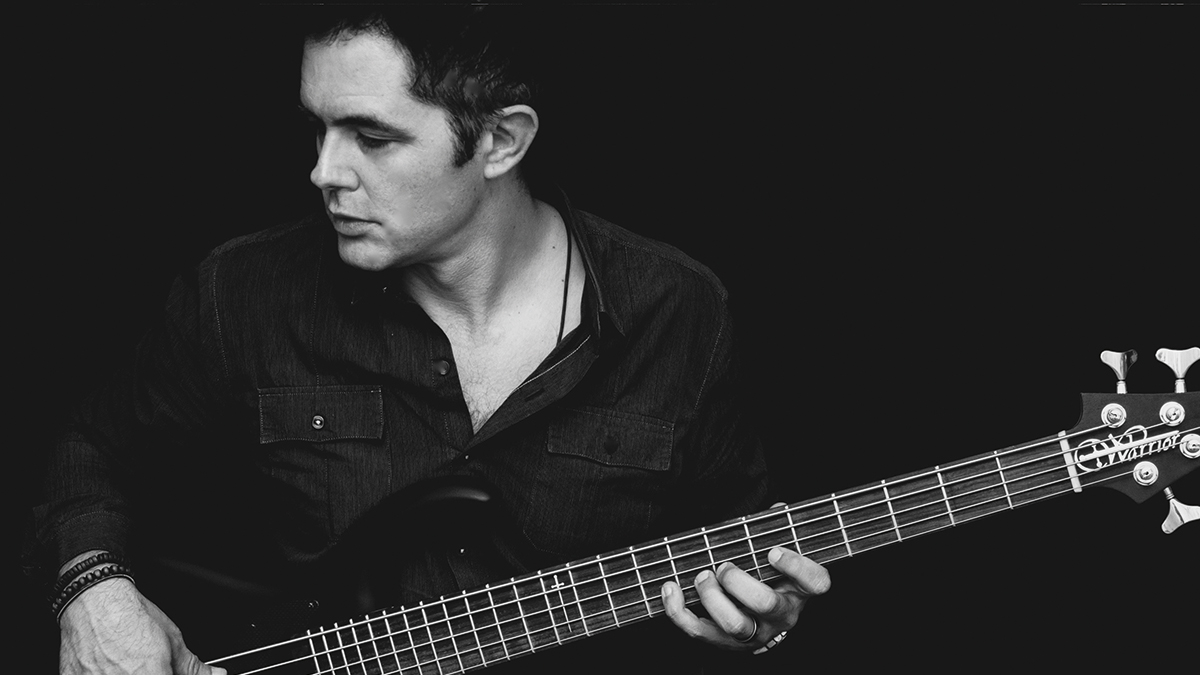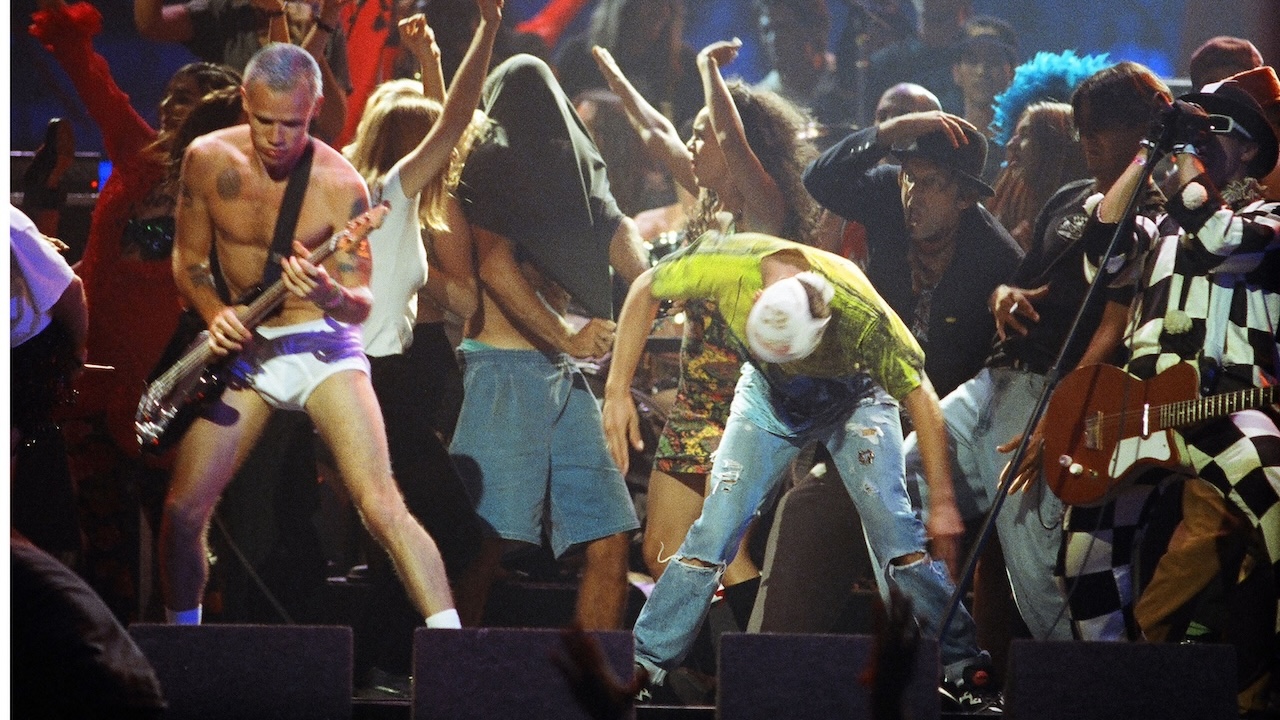DMC & The Hellraisers’ David Filice: “Amateurs learn something until they can play it right – professionals learn something ‘til they can’t play it wrong”
The bass player for Darryl ‘DMC’ McDaniels’ hard-rocking hip-hop fusion band unpacks the story of his career in his own words

All the latest guitar news, interviews, lessons, reviews, deals and more, direct to your inbox!
You are now subscribed
Your newsletter sign-up was successful
DMC & the Hellraisers is a band led by Darryl ‘DMC’ McDaniels from hip-hop legends Run DMC. The group also features Veronica Bellino from Life of Agony on drums and vocals; Rich Devletian, formerly of Ours, on guitar; and DJ Charlie Chan Soprano, who came in after the passing of Jam Master Jay in Run DMC when they started touring again. The music is a fusion of hip-hop and hard rock.
Here, bass player David Filice presents the story of his involvement with the project in his own words.
How I got into it was a lesson out of the touring handbook – make sure your passport is always valid. I was recommended by a guitar player friend of mine, because the bass player was having passport issues.
They had a one-off show at a festival in Switzerland with Run DMC and Snoop Dogg headlining, and Darryl had a solo band that was playing at the festival as well. I was available and learned all the songs inside and out. They were recording in Los Angeles a few months later, and they called me in for the session.
We ended up writing a new song that day in the studio and the rest is history. We’ve been writing songs, working on an album, and playing shows together ever since. That was about eight years ago now. We have always had a good chemistry and flow, both onstage and creatively. DMC is a master at his craft, and just flows with new songs like it’s breathing for him.
I grew up in what seemed to be a unique era in the music industry, when MTV was the new platform and the dominant delivery system for new music. When I was 14 a friend of mine played me Limelight by Rush and that was it. At that point I really didn’t know much about the bass, but I knew I needed to play it, and I have been hooked ever since. I loved the way the instrument sounded and the role it played in the music.
Geddy Lee has always been my biggest influence on bass, and I was obsessed with Rush and his melodic basslines from the start. From there I discovered Steely Dan and the bass work Chuck Rainey and Walter Becker did on those albums, along with all the other brilliant musicians.I was like a sponge, and always had a good ear, so I would just listen and learn as many songs and basslines as I could.
All the latest guitar news, interviews, lessons, reviews, deals and more, direct to your inbox!
You could give the biggest piece of junk bass made out of driftwood to a player with great technique, and they will make it sound good
Some of my other favorites in the early days that got me hooked on the bass even more were Rocco Prestia, Sting, Roger Waters, James Jamerson, Michael Anthony, Flea, and Steve Harris. I didn’t discover Jaco Pastorius till a bit later, but it was long enough ago that I ordered his instructional video on VHS from the pages of Bass Player magazine!
I got my first bass when I was 14, and I’ll admit it was probably not the most practical choice. It was a white BC Rich Warlock. I was always into rock and metal from early on, so the idea for my first bass probably came from watching Mötley Crüe videos as a kid.
The Warlock that I had wasn’t very comfortable to play and practice on, but I just thought it looked awesome at the time. I guess I was probably more interested in literal form than function. Shortly after, I ordered a black custom Carvin, which was a much better bass to play and learn on, and offered more versatility than the Warlock. When I got that second bass was when I really started studying and practicing.
For a while, there it was just the Carvin, an Ernie Ball StingRay 5, and an American-made Fender Custom Shop P-Bass. I have added more over the years, and I have two favorites at the moment – my 1991 reissue of a ’73 Jazz bass, and my Yamaha BBNE 5. Nathan East, who has always been one of my favorite players, designed this bass, and it is one of the best basses I have ever played and heard. It just has this tone that I always wanted.
I also have a Michael Kelly acoustic five-string that I really like, and my Ernie Ball Stingray is always one of my favorites. But as the saying goes, ‘It’s not the wand, it’s the wizard.’ At the end of the day, you could give the biggest piece-of-junk bass made out of driftwood to a player with great technique, and they will make it sound good.
As far as amps go, I partnered with Gallien-Krueger about 12 years ago: my live amp is a 2001 RB head and a 4x10 RBH cabinet. Their new stuff is great, but I have all I need with this amp, and it has some serious power. Currently on my pedalboard I have a Darkglass Vintage Ultra preamp/DI, Aguilar Octamizer, a Boss chorus pedal, and a Boss tuner.
A great piece of advice is that ‘Amateurs learn something until they can play it right, professionals learn something ‘til they can’t play it wrong.’ I read an interview one time with the legendary [Rush drummer] Neil Peart, and he mentioned he learns a song till he can play it five times in a row flawlessly – and I have followed that advice closely throughout my career.
I always made it a goal before I would step into a rehearsal that I would try and know the music better than the artist themselves. That way, rehearsal is about getting to know the other players musically and being present, instead of trying to remember parts.
Of course, sometimes it’s nice not to over-prepare and leave an element of rawness to the show, but when I’m hired by other artists to play their music, I don’t have that luxury. There is a difference in approach professionally between being in a band and being a hired gun.
When I’m working with a new band or artist, I try and take the approach of, ‘If this first rehearsal was the show, am I ready?’ When that answer becomes yes, my prep is done. That’s where that advice always comes in handy. When I’m putting together a band for an artist, I think of who could nail the show with one rehearsal. I want those players who come in prepared from the start.
- Raw Cane Sugar is out now.
Bass Player is the world’s most comprehensive, trusted and insightful bass publication for passionate bassists and active musicians of all ages. Whatever your ability, BP has the interviews, reviews and lessons that will make you a better bass player. We go behind the scenes with bass manufacturers, ask a stellar crew of bass players for their advice, and bring you insights into pretty much every style of bass playing that exists, from reggae to jazz to metal and beyond. The gear we review ranges from the affordable to the upmarket and we maximise the opportunity to evolve our playing with the best teachers on the planet.

